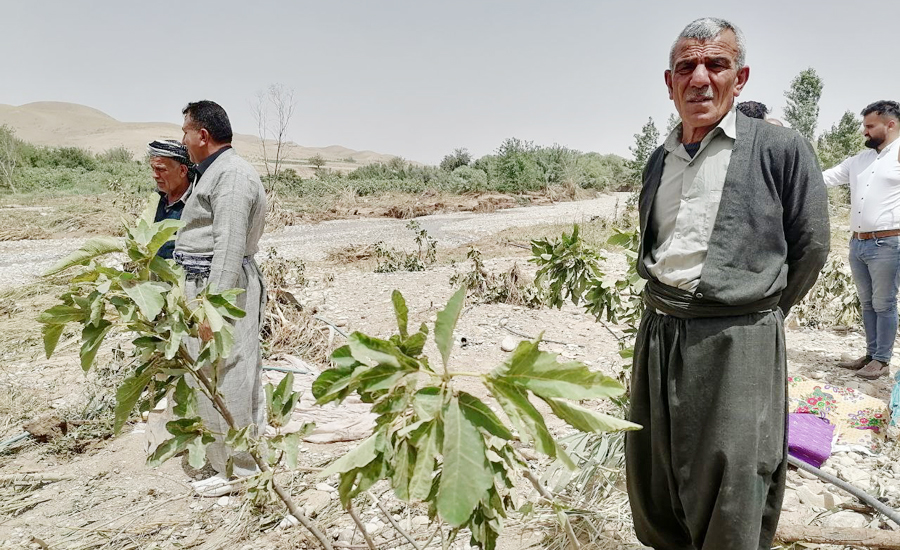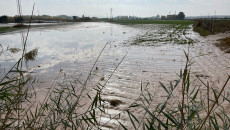The farmers of the village of Khalobaziani, in the Qarahangir sub-district, east of Kirkuk, are demanding financial compensation for the damage they sustained due to the floods that inundated 70 orchards of fruit trees in the village.
In total, about 250 to 300 orchards were damaged in the two sub-districts of Qaranjir and Lilan, southwest of Kirkuk, according to the statistics of the Kirkuk Department of Agriculture.
The 70 orchards of the village of Khalobaziani were completely destroyed due to the heavy rains and floods that swept the area on May2nd, including orchards of fig trees, pomegranate, peach and other types of fruit marketed in Kirkuk and all over Iraq.
Mahdi Huzaem spent the second day of Eid al-Fitr, May 3rd, cleaning up what was left of the floods in his orchard.
The fatigue of 20 years has gone for nothing
"The fatigue of 20 years has gone for nothing,” he sadly said, holding a spade to clean up the farm.
"My entire garden was destroyed in a matter of minutes. The torrents washed away all the fruit trees and the mud has covered water wells." Huzaem, 65, said about his decades-old orchard.
Unofficial statistics obtained by KirkukNow from the village's farmers indicate that the floods destroyed 70 orchards, as these orchards represented the main source of livelihood for some families.
"We want the government to compensate us for our big losses."
Video: Khalobaziani village farmers talk about the damage to their orchards. KirkukNow
The northern, oil-rich city of Kirkuk, center of the disputed territories between Baghdad and Erbil, has 1.5 billion square meters of agricultural farmlands, out of which 0.9 billion is allocated for wheat, 2020 statistics of directorate of Kirkuk agriculture show.
Absence of state support and poor rainfall has sharply dropped down production of crops. Kirkuk meteorology said the total rain in 2021 was only 104mm compared to 283mm in 2020 and 535mm in 2019.
The villagers estimate the losses at about one billion dinars, but the Kirkuk Agriculture Department says that these estimates are exaggerated.
The village of Khalobaziani is located in a valley characterized by its suitability for gardening, especially the cultivation of fig trees.
Rebwar Sami, another farmer of Khalobaziani, said, "The torrents damaged not only trees, but agricultural equipment and machinery, roads and water springs as well. We appeal to the government to restore roads, rehabilitate and revive water springs and provide farmers with the necessary equipment, as well as paying financial compensation.”
The floods destroyed 25 km of the main road that connects dozens of villages in the area.
The members of the Iraqi parliament from Kirkuk are trying to give the farmers a hand.
Sabah Habib, a representative from the Kirkuk province in the Iraqi parliament, told (KirkukNow), "We have seen the damage caused to the farmers, which unfortunately is very great. We are now preparing a report in this regard in order to direct it to the government in order to compensate the farmers."
Local officials are trying to determine the scope of the damages.
Our goal now is to obtain the government's approval to pay the compensation
For his part, Zuhair Ali, director of Kirkuk's Agriculture Department, said, "We assigned the agricultural people to estimate the size of the losses incurred on agricultural lands in the districts of Qaranjir and Lilan."
"Three thousand dunums of agricultural land in these two districts were damaged by torrential rains and floods."
Statistics from the Kirkuk Department of Agriculture indicate that about 250 to 300 orchards in Qaranjir and Lilan have been damaged.
"We will make our own assessments to estimate the extent of the damages and send it to the Ministry of Agriculture to undertake, in coordination with the federal government, compensation for the affected,” he added.
“Our goal now is to obtain the government's approval to pay the compensation," said the director of the Kirkuk Agriculture Department.






